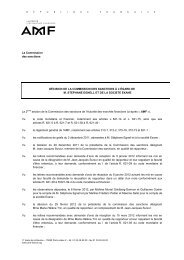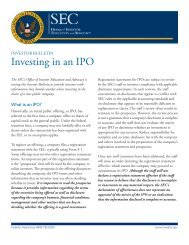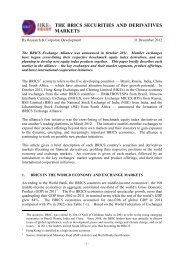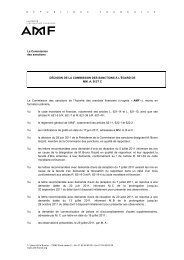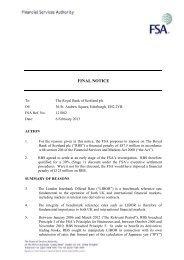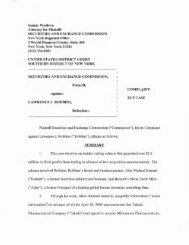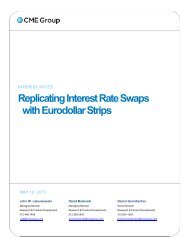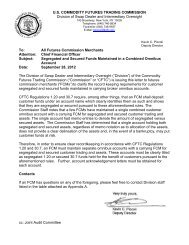Final Notice - Financial Conduct Authority
Final Notice - Financial Conduct Authority
Final Notice - Financial Conduct Authority
Create successful ePaper yourself
Turn your PDF publications into a flip-book with our unique Google optimized e-Paper software.
FINAL NOTICETo:Of:Nestor Healthcare Group LimitedEnbrook ParkSandgateFolkstoneKentCT20 3SEDate: 14 February 20131. ACTION1.1 For the reasons given in this <strong>Notice</strong>, the FSA hereby imposes on Nestor HealthcareGroup Limited (“Nestor/the company”) a financial penalty of £175,000.1.2 Nestor agreed to settle at an early stage of the FSA’s investigation and thereforequalified for a 30% (stage 1) discount under the FSA’s executive settlementprocedures. Were it not for this discount, the FSA would have imposed a financialpenalty of £250,000 on Nestor.2. SUMMARY OF REASONS2.1 In the period 18 October 2006 to 30 June 2010 (“the relevant period”) Nestor did nottake all proper and reasonable steps to secure the compliance of persons discharging
managerial responsibility (“PDMRs”) with paragraphs 3-7 of the Model Code. Byfailing to do so, Nestor breached Listing Rule 9.2.8 (“LR9.2.8R”).2.2 Nestor also did not take reasonable steps to enable its directors to understand theirresponsibilities and obligations under paragraphs 3-7 of the Model Code or tomaintain adequate procedures, systems and controls to enable it to comply with itsobligations under LR9.2.8R. Although Nestor implemented a Share Dealing Policyadherence to which would, at the time it was introduced, have ensured compliance byPDMRs with the Model Code, Nestor did not take reasonable steps to ensureadherence to the requirements of the Share Dealing Policy, and to review and update itwhere necessary. Rather than following the procedure specified in the Share DealingPolicy, an ad hoc and informal process was utilised. As a result, Nestor breachedListing Principles 1 and 2.2.3 As a result of these failings, in the relevant period:(1) PDMRs at Nestor did not fully understand their responsibilities underparagraphs 3-7 of the Model Code;(2) two purchases of company shares by PDMRs (90,000 shares worth £47,700on 26 May 2010 and 110,000 shares worth £65,360 on 30 June 2010) werecarried out without the required approval under the Model Code (i.e. of thewhole board) being sought or obtained;(3) one purchase of company shares (37,957 shares worth £19,999.54 on 25 May2010) by a PDMR was carried out over two months after the proper clearancewas received, rather than within two business days as required; and(4) on four occasions the company failed to maintain a record of responses toclearance to deal requests and to provide a copy of the clearance to therestricted person concerned, as required by the Model Code.2.4 For the avoidance of doubt, the FSA does not allege that any of the dealings notedabove were based on inside information.3. DEFINITIONS3.1 The definitions below are used in this Decision <strong>Notice</strong>:“Nestor” or “the company” means Nestor Healthcare Group“Acromas” means Acromas Holdings Limited“the Act” means the <strong>Financial</strong> Services and Markets Act 2000“the FSA” means the <strong>Financial</strong> Services <strong>Authority</strong>“UKLA” means the United Kingdom Listing <strong>Authority</strong>“LSE” means the London Stock Exchange2
“PDMR” means a person discharging managerial responsibility as defined in section96B(1) of the Act and the Glossary to the FSA Handbook (reproduced in the Annex tothis <strong>Notice</strong>).“Connected Person” means a person with a connection to a PDMR as defined insection 96B(2) of the Act and the Glossary to the FSA Handbook“the Tribunal” means the Upper Tribunal (Tax and Chancery Chamber)4. RELEVANT STATUTORY AND REGULATORY PROVISIONSRelevant legislative provisions4.1 The FSA has power, pursuant to section 91(1) of the Act, to impose a financial penaltyon an issuer of listed securities if the FSA considers that the issuer has contravenedany provision of listing rules.Listing Rules and the Model Code4.2 The Listing Rules are made by the FSA pursuant to Part VI of the Act and set out therequirements for the admission of securities to the Official List and the continuingobligations of companies whose securities are so admitted.4.3 Chapter 9 of the Listing Rules sets out the requirements with continuing application toa company with a premium listing. LR9.2.8R states:“A listed company must require every person discharging managerial responsibilities,including directors to comply with the Model Code and to take all proper andreasonable steps to secure their compliance.”4.4 The FSA regards the continuing obligation requirements of Chapter 9 of the ListingRules as a fundamental protection for shareholders.4.5 The Model Code imposes restrictions on dealing in the securities of a listed companybeyond those imposed by law. Its purpose is to ensure that PDMRs do not abuse, anddo not place themselves under suspicion of abusing, inside information they may bethought to have. The clearance to deal provisions of the Model Code are a keycomponent in ensuring that listed companies meet this objective.4.6 The Model Code is Annex 1 to Chapter 9 of the Listing Rules. The provisions of theModel Code relevant to this <strong>Notice</strong> are contained in the Annex to this <strong>Notice</strong>.Listing Principles4.7 The purpose of the Listing Principles is to ensure that listed companies pay due regardto the fundamental role they play in maintaining market confidence and ensuring fairand orderly markets. They are designed to assist listed companies in identifying theirobligations and responsibilities under the Listing Rules and the Disclosure Rules andTransparency Rules.4.8 Listing Principle 1 states:3
“A listed company must take reasonable steps to enable its directors to understandtheir responsibilities and obligations as directors.”4.9 Listing Principle 2 states:“A listed company must take reasonable steps to establish and maintain adequateprocedures, systems and controls to enable it to comply with its obligations.”5. FACTS AND MATTERSBackground5.1 Throughout the relevant period:(1) the Nestor board comprised the roles of chief executive, non-executivechairman, finance director and two non-executive directors; 1(2) between May 2008 and July 2010 Nestor’s chairman also acted as chiefexecutive, during which time he continued to work on a part-time basis;(3) all members of the Nestor board and certain other senior executives werePDMRs pursuant to section 96B(1) of the Act;(4) shares in Nestor were admitted to listing on the Official List of the UnitedKingdom Listing <strong>Authority</strong> (“UKLA”) and admitted to trading on the MainMarket of the London Stock Exchange (“LSE”); and(5) Nestor held Premium Listing status and was therefore subject to the applicationof Chapter 7 of the Listing Rules (Listing Principles) and Chapter 9 of theListing Rules (Continuing Obligations).Share Dealing Policy5.2 On 17 October 2005 a memorandum regarding dealings in the shares of Nestor wascirculated to Nestor PDMRs by the company secretary. This memorandum set out theinternal policy by which all dealings in Nestor shares by PDMRs and connectedpersons were to be governed (“the Share Dealing Policy”) and formed part of thecontract of employment of those who received it. The Share Dealing Policy had beendrafted by external legal advisers instructed by Nestor, in order to secure compliancewith the Model Code.5.3 This policy was in place throughout the relevant period and incorporated therequirements of the Model Code as they applied to Nestor at the time. With regard toPDMRs or their connected persons the Share Dealing Policy:(1) prohibited dealing in Nestor shares without prior written approval;1 The Nestor board also had an additional executive director until 31 December 2006 and another non-executivedirector until 2 March 20074
(2) required the completion of a prescribed document for dealing requests to besubmitted to the company secretary and subsequently approved by the chiefexecutive or chairman;(3) set out that all transactions must take place within two business days of approvalbeing given; and(4) required notification of approved dealings to be submitted to the companywithin four business days of the date of dealing using a prescribed document.5.4 The policy was circulated to all directors, PDMRs and employee insiders, each ofwhom were asked to, and did, return a signed acknowledgement confirming that theyhad read and understood the requirements and would comply with them.5.5 Although the Company took steps to comply with its other obligations under theModel Code, such as issuing six-monthly reminders to all directors, PDMRs andemployee insiders reminding them that they were not permitted to trade during a closeperiod or otherwise where they were in possession of inside information, afterdistributing the Share Dealing Policy Nestor did not issue any reminders or trainingabout its content or the requirement to comply with it, or otherwise reinforceawareness of the Share Dealing Policy. This, combined with the very low number ofactual dealings by PDMRs, resulted in Nestor PDMRs forgetting that the ShareDealing Policy existed and that they were required to comply with it.PDMR dealing compliance arrangements5.6 Within Nestor there was recognition of the need for share dealing approval for PDMRdealing and of the importance of compliance with FSA rules. As explained above,however, Nestor's PDMRs were not reminded of the requirements of the ShareDealing Policy and Nestor relied on the experience and knowledge of its boardmembers to enable it to meet the requirements of paragraphs 3-7 of the Model Code.5.7 In the relevant period Nestor did not carry out any reviews of its PDMR share dealingcompliance arrangements.Share dealing in the relevant period5.8 The following purchases of Nestor shares were made by Nestor PDMRs in therelevant period:Date Purchaser Amount Price (p)10 April 2008 Chairman 100,000 42.758 January 2009 Senior executive 1 14,117 21.2516 April 2009 Chairman 50,000 24.825
16 April 2009 Board member A 50,000 24.8216 April 2009 Board member B 50,000 24.8211 March 2010 Chairman 81,500 51.9011 March 2010 Board member A 100,000 5211 March 2010 Board member C 25,024 51.9525 May 2010 Board member B 37,957 52.6926 May 2010 Chairman 90,000 5330 June 2010 Chairman 40,000 58.4030 June 2010 Chairman 70,000 605.9 Under the Model Code, the directors of Nestor required clearance to deal from thechairman. Senior executives who qualified as PDMRs but were not directors wererequired by the Model Code to obtain clearance to deal from the company secretary ora designated director. Before his appointment as acting chief executive, the ModelCode required Nestor’s chairman to obtain clearance to deal from the chief executivein the first instance, and when both chairman and acting chief executive (as he was atthe time of all share purchases recorded in paragraph 5.8 above) he was required toobtain clearance to deal from the whole board.5.10 No other company officer or committee of the board was designated by Nestor to giveclearance to deal, as is provided for by paragraphs 4 (a) – (c) of the Model Code.5.11 The documents prescribed in Nestor’s Share Dealing Policy were not used to recordthe application for or granting of dealing approval for any transactions by PDMRs inthe relevant period. Instead, when seeking to purchase shares PDMRs generallydiscussed the matter with each other by email or verbally, seeking and granting whatthey considered to be the appropriate approval.5.12 Due to the lack of records available the FSA has not been able to ascertain whether,and if so how, the chairman sought and received approval for his transaction on 10April 2008.5.13 Due to the lack of records available the FSA has not been able to ascertain whether,and if so how, senior executive 1 sought and received approval for his transaction on 8January 2009.5.14 The chairman and board members A and B discussed their intention to purchaseshares on 16 April 2009 before doing so. Board member C was not asked to provideclearance for the chairman’s transaction, but was aware of the intended purchase andhad no objection to it taking place.5.15 Board member C sought and received approval for his purchase on 11 March 2010from the chairman by email.6
5.16 Board member A sought approval for his transaction on 11 March 2010 in an email toboard member C, board member B, senior executive 2 and the chairman on 10 March2010. The chairman did not respond directly with approval for the request; howeveran email from senior executive 2 on the same day records the chairman’s approval forthat and certain other PDMR dealings.5.17 The chairman requested consent for his 11 March 2010 purchase in an email to boardmember C on 2 March 2010, who then purported to provide that consent by reply.Subsequently, the chairman’s request was forwarded to board members A and B andfurther discussion around PDMR dealing took place. Subsequently, all members ofthe Nestor board were aware of the chairman’s desire to trade on 10 March 2010 anddid not oppose it.5.18 Board member B sought consent to deal in early March 2010 in an email to which thechairman was a recipient. Subsequent email correspondence concluding on 12 March2010 shows that the chairman was aware of board member B’s desire to trade and didnot oppose it. Board member B subsequently purchased 37,957 shares over twomonths later on 25 May 2010, having beforehand contacted senior executive 2regarding his desire to purchase shares, but without fresh approval from the chairmanbeing obtained.5.19 The chairman sought approval for his 26 May 2010 trade verbally from a fellowdirector prior to dealing. There is no record of this approval being sought or granted.5.20 On 30 June 2010 the chairman purchased 70,000 Nestor shares at 60p and 40,000 at58.40p. The chairman verbally sought approval for these transactions from a fellowdirector on 29 June 2010.5.21 On 6 December 2010 Nestor announced that it had reached agreement with Acromason the terms of a cash acquisition of the company by the Acromas group. Nestorshares were delisted from the UKLA Official List and ceased trading on the LSE on 3February 2011 following completion of the takeover of the company.5.22 All of the PDMR dealings were reported to the market as required by DTR 3.1.4R.6. FAILINGSListing Rule 9.2.86.1 Under LR9.2.8R a listed company must require every PDMR, including directors, tocomply with the Model Code and to take all reasonable steps to secure theircompliance.6.2 As noted above, the purpose of the Model Code is to ensure that PDMRs do notabuse, and do not place themselves under suspicion of abusing, inside information thatthey may be thought to have, especially in periods leading up to an announcement ofthe company's results.6.3 The FSA accepts that Nestor's PDMRs understood their obligation not to trade on thebasis of inside information and the requirement to seek clearance prior to any dealing7
in Nestor's shares. The steps taken by them to seek clearance for the dealingsdescribed above were in keeping with the purpose of the Model Code. The FSA alsoaccepts that none of the dealings took place on the basis of inside information.6.4 For the following reasons, however, the FSA is satisfied that Nestor failed to ensureits PDMRs fully understood the requirements imposed under paragraphs 3-7 of theModel Code, and that it failed to take all proper and reasonable steps to secure thecompliance of its PDMRs with these provisions.Not reinforcing awareness of the Share Dealing Policy(1) By failing to issue any reminders or training with regard to the content of or theneed to comply with its Share Dealing Policy, Nestor failed to ensure that thePDMRs were, on an ongoing basis, aware of the Share Dealing Policy whichwould, in turn, have made them aware of and ensured their compliance with allof the requirements of paragraphs 3-7 of the Model Code.Relying on experience and knowledge of directors(2) Nestor’s reliance on the experience and knowledge of its board members aloneto enable it to meet the requirements of paragraphs 3-7 of the Model Code wasinsufficient and increased the risk that PDMR dealings would be conducted inbreach of the Model Code. This risk crystallised within the relevant period inthat, although none of the dealings were on the basis of inside information,certain of the transactions did not comply with all of the requirements ofparagraphs 3-7 of the Model Code.Not reviewing the adequacy of its PDMR share dealing arrangements(3) In the relevant period Nestor did not review the adequacy of its PDMR sharedealing arrangements. In not doing so, the company overlooked a method bywhich poor practice could have been identified.Breaches of the Model Code(4) In the relevant period the following breaches of the Model Code 2 took place:(a)Paragraph 3 of the Model Code states that a restricted person must not dealin shares of the company without obtaining clearance to deal in accordancewith paragraph 4 of the Model Code. Paragraph 4(d) of the Model Codestates that if the roles of chairman and chief executive are combined, asthey were at Nestor between April 2008 and July 2010, that person mustnot deal in shares of the company without first notifying and receivingclearance from the board. Prior to dealing on 26 May 2010 and 30 June2010 the chairman sought and received permission to deal from a singleboard member only.2 The precise wording of the Model Code changed on 6 March 2009, however these changes have no effect onNestor's breach of LR9.2.8 and Listing Principles 1 and 28
(b)(c)Paragraph 7 of the Model Code states that upon receiving clearancerestricted persons must deal as soon as possible and in any event withintwo business days. Board member B’s trade of 25 May 2010 was executedtwo months after he was granted clearance to deal by the chairman on 12March 2010. Given the passage of time the FSA regards the earlierclearance to deal as having lapsed. Although board member B contactedsenior executive 2 regarding his intention to trade within two days beforedealing, board member B did not appreciate that the chairman was the onlyperson who could grant a fresh clearance to deal.Paragraph 6 of the Model Code states that a company must maintain arecord of the response to any dealing request made by a restricted personand of any clearance given. A copy of the response and clearance (if any)must be given to the restricted person concerned. For the transactions on10 April 2008, 8 January 2009, 16 April 2009 and 26 May 2010, Nestorfailed to maintain such records and consequently did not provide a copy ofthe clearance given to the restricted person(s) concerned.(5) No Nestor board member involved in approving the dealings described atparagraph 5.8 above realised that an individual who is both chairman and chiefexecutive needed the approval of the entire board to deal.(6) These breaches are evidence of Nestor’s failure to ensure its PDMRs fullyunderstood their obligations under paragraphs 3-7 of the Model Code, and ofNestor's failure to take all proper and reasonable steps to secure their compliancewith those provisions.Failure to identify ongoing breaches(7) Nestor failed to identify that its PDMRs had forgotten that they were required tocomply with the Share Dealing Policy, and were not doing so, or that breaches ofthe Model Code had taken place.6.5 For the reasons listed above, the FSA is satisfied that Nestor breached LR9.2.8R.Listing Principles6.6 Nestor’s failure to take all proper and reasonable steps to ensure that its PDMRs were,on an ongoing basis, aware of all of the requirements of paragraphs 3-7 of the ModelCode and of the Share Dealing Policy is also a breach of Listing Principles 1 and 2, asby not doing so the company:(1) failed to take reasonable steps to enable its directors to understand fully theirresponsibilities and obligations as directors under the Model Code, in breach ofListing Principle 1; and(2) failed to take reasonable steps to maintain adequate procedures, systems andcontrols to enable it to comply with its obligations under LR9.2.8R, in breach ofListing Principle 2.9
6.7 Nestor’s reliance on the experience and knowledge of its board members to meet therequirements of paragraphs 3-7 of the Model Code, rather than a robust process whichensured adherence to the Share Dealing Policy, is a breach of Listing Principle 2 as bydoing so it failed to take reasonable steps to maintain adequate procedures, systemsand controls to enable it to comply with its obligations under LR9.2.8R. Theinadequacy of the systems and controls within Nestor is evidenced by:(1) the breaches of the Model Code detailed above; and(2) the fact that the chairman did not directly seek the approval of the entire boardfor his transactions on 16 April 2009 and 11 March 2010, and that theappropriate approval was achieved implicitly rather than because he or the boardappreciated the need under the Model Code for entire board approval of hisdealings.7. SANCTIONPenalty7.1 The FSA considers it appropriate to impose a financial penalty on Nestor. As theperiod over which Nestor’s breaches occurred is largely prior to 6 March 2010, thefinancial penalty is considered under the policy in force before that date.7.2 The FSA’s policy on the imposition of financial penalties prior to 6 March 2010 wasset out in Chapter 6 of the Decision Procedures and Penalties Manual (“DEPP”),which forms part of the FSA Handbook. In reaching this view and in determining theappropriate level of penalty, the FSA has had regard to the provisions of DEPP set outin the Annex to this <strong>Notice</strong>.7.3 DEPP 6.1.2G sets out that the principal purpose of imposing a financial penalty is topromote high standards of regulatory and market conduct by deterring persons whohave committed breaches from committing further breaches, helping to deter otherpersons from committing similar breaches and demonstrating generally the benefits ofcompliant behaviour.7.4 DEPP 6.5 (as it applied during the relevant period) sets out some of the factors thatmay be taken into account when the FSA determines the level of a financial penaltythat is appropriate and proportionate to the misconduct. They are not exhaustive butinclude deterrence, the nature, seriousness and impact of the breach, the extent towhich the breach was deliberate or reckless, financial resources and othercircumstances, the disciplinary record and compliance history of the person, theirconduct following the breach, and the action that the FSA has taken in relation tosimilar misconduct by other persons.7.5 The FSA has had regard to the following factors:(1) the duration of the breach, from 18 October 2006 to 30 June 2010;(2) the failings in Nestor’s internal processes, including:10
(a)(b)(c)the absence of any reinforcement of the need to comply with the ShareDealing Policy, which (combined with the low level of instances of PDMRdealing) resulted in Nestor PDMRs forgetting that they were required tocomply with it;the consequent failure to comply with the Share Dealing Policy, whichwent undetected; andNestor’s failure to review its clearance to deal procedures.(3) the breaches of the Model Code that took place in the relevant period, whichalso went undetected; and(4) the need for a strong deterrence message with regard to listed companies’compliance with the Model Code.7.6 The FSA has also had regard to the following mitigating factors:(1) the breach was not deliberate or reckless;(2) Nestor's PDMRs understood their obligation not to trade on the basis of insideinformation and the requirement to seek clearance prior to any dealing inNestor's shares. The steps taken by them to seek clearance for dealings were inkeeping with the purpose of the Model Code;(3) none of the dealings took place on the basis of inside information;(4) Nestor did not benefit financially from its misconduct;(5) Nestor has cooperated fully with the FSA’s investigation;(6) in order to help secure compliance with the requirements of LR9.2.8R, Nestorinstructed external legal advisors to assist with the drafting of the Share DealingPolicy;(7) the Share Dealing Policy was circulated to all Nestor directors, PDMRs andemployee insiders in October 2005, each of whom was asked to, and did, returna signed acknowledgement confirming that they had read and understood therequirements of the Share Dealing Policy and would comply with them;(8) Nestor took steps to comply with its other obligations under the Model Code,including issuing six-monthly reminders to all directors, PDMRs and employeeinsiders regarding the restriction on trading during close periods and whilst inpossession of inside information, and also took steps to ensure that directors didnot trade on a short term basis;(9) none of the breaches had any adverse effect on markets. They caused no loss orrisk of loss to investors, and no financial crime took place as a result of thebreaches; and(10) no previous disciplinary action has been taken against Nestor.11
7.7 On considering the various factors above the FSA has determined that it is appropriateto impose a financial penalty of £175,000 on Nestor.8. PROCEDURAL MATTERSDecision maker8.1 The decision which gave rise to the obligation to give this <strong>Notice</strong> was made by theSettlement Decision Makers.8.2 This <strong>Final</strong> <strong>Notice</strong> is given under and in accordance with section 390 of the Act.Manner of and time for Payment8.3 The financial penalty must be paid in full by Nestor to the FSA by no later than 28February 2013, 14 days from the date of the <strong>Final</strong> <strong>Notice</strong>.If the financial penalty is not paid8.4 If all or any of the financial penalty is outstanding on 29 February 2013, the FSA mayrecover the outstanding amount as a debt owed by Nestor and due to the FSA.Publicity8.5 Sections 391(4), 391(6) and 391(7) of the Act apply to the publication of informationabout the matter to which this <strong>Notice</strong> relates. Under those provisions, the FSA mustpublish such information about the matter to which this <strong>Notice</strong> relates as the FSAconsiders appropriate. The information may be published in such manner as the FSAconsiders appropriate. However, the FSA may not publish information if suchpublication would, in the opinion of the FSA, be unfair to you or prejudicial to theinterests of consumers.8.6 The FSA intends to publish such information about the matter to which this <strong>Final</strong><strong>Notice</strong> relates as it considers appropriate.FSA contacts8.7 For more information concerning this matter generally, contact Celyn Armstrong(direct line: 020 7066 2818) or Simon Bowker (direct line: 020 7066 5308) of theEnforcement and <strong>Financial</strong> Crime Division of the FSAJamie SymingtonHead of DepartmentFSA Enforcement and <strong>Financial</strong> Crime Division12
ANNEXTHE MODEL CODE - INTRODUCTION AND PARAGRAPHS 3-7IntroductionThis code imposes restrictions on dealing in the securities of a listed company beyond thoseimposed by law. Its purpose is to ensure that persons discharging managerial responsibilitiesdo not abuse, and do not place themselves under suspicion of abusing, inside information that13
they may be thought to have, especially in periods leading up to an announcement of thecompany's results.Nothing in this code sanctions a breach of section 118 of the Act (Market abuse), the insiderdealing provisions of the Criminal Justice Act or any other relevant legal or regulatoryrequirements.Paragraph 3: Dealing by restricted persons3) A restricted person must not deal in any securities of the company without obtainingclearance to deal in advance in accordance with paragraph 4 of this code.Paragraphs 4 – 7: Clearance to deal4) (a) A director (other than the chairman or chief executive) or company secretary must notdeal in any securities of the company without first notifying the chairman (or adirector designated by the board for this purpose) and receiving clearance to deal fromhim.(b) The chairman must not deal in any securities of the company without first notifyingthe chief executive and receiving clearance to deal from him or, if the chief executiveis not present, without first notifying the senior independent director, or a committeeof the board or other officer of the company nominated for that purpose by the chiefexecutive, and receiving clearance to deal from that director, committee or officer.(c) The chief executive must not deal in any securities of the company without firstnotifying the chairman and receiving clearance to deal from him or, if the chairman isnot present, without first notifying the senior independent director, or a committee ofthe board or other officer of the company nominated for that purpose by the chairman,and receiving clearance to deal from that director, committee or officer.(d) If the role of chairman and chief executive are combined, that person must not deal inany securities of the company without first notifying the board and receiving clearanceto deal from the board.(e) Persons discharging managerial responsibilities (who are not directors) must not dealin any securities of the company without first notifying the company secretary or adesignated director and receiving clearance to deal from him.5) A response to a request for clearance to deal must be given to the relevant restrictedperson within five business days of the request being made.6) The company must maintain a record of the response to any dealing request made by arestricted person and of any clearance given. A copy of the response and clearance (ifany) must be given to the restricted person concerned.14
7) A restricted person who is given clearance to deal in accordance with paragraph 4 mustdeal as soon as possible and in any event within two business days of clearance beingreceived.GLOSSARY TO FSA HANDBOOKPERSON DISCHARGING MANAGERIAL RESPONSIBILITYA “person discharging managerial responsibilities” is (in accordance with section 96B(1) ofthe Act):15
(a) a director of an issuer:(i) registered in the United Kingdom that has requested or approved admission of itsshares to trading on a regulated market; or(ii) not registered in the United Kingdom or any other EEA State but has requested orapproved admission of its shares to trading on a regulated market and who is requiredto file annual information in relation to shares in the United Kingdom in accordancewith Article 10 of the Prospectus Directive; or(b) a senior executive of such an issuer who:(i) has regular access to inside information relating, directly or indirectly, to the issuer;and(ii) has power to make managerial decisions affecting the future development andbusiness prospects of the issuer.DEPP 6.1.1DEPP 6.116
DEPP 6 includes the FSA's statement of policy with respect to the imposition and amount ofpenalties under the Act, as required by sections 69(1), 93(1), 124(1), and 210(1) of the Act.DEPP 6.1.2The principal purpose of imposing a financial penalty or issuing a public censure is topromote high standards of regulatory and/or market conduct by deterring persons who havecommitted breaches from committing further breaches, helping to deter other persons fromcommitting similar breaches, and demonstrating generally the benefits of compliantbehaviour. <strong>Financial</strong> penalties and public censures are therefore tools that the FSA mayemploy to help it to achieve its regulatory objectives.DEPP 6.5DEPP 6.5 Determining the appropriate level of financial penaltyDEPP 6.5.1(1) The FSA will consider all the relevant circumstances of a case when it determines thelevel of financial penalty (if any) that is appropriate and in proportion to the breachconcerned. The list of factors in DEPP 6.5.2 G is not exhaustive: not all of these factors maybe relevant in a particular case, and there may be other factors, not included below, that arerelevant.(2) The FSA does not apply a tariff of penalties for different kinds of breach. This is becausethere will be very few cases in which all the circumstances of the case are essentially the sameand because of the wide range of different breaches in respect of which the FSA may takeaction. The FSA considers that, in general, the use of a tariff for particular kinds of breachwould inhibit the flexible and proportionate policy which it adopts in this area.DEPP 6.5.2The following factors may be relevant to determining the appropriate level of financialpenalty to be imposed on a person under the Act:(1) DeterrenceWhen determining the appropriate level of penalty, the FSA will have regard to the principalpurpose for which it imposes sanctions, namely to promote high standards of regulatoryand/or market conduct by deterring persons who have committed breaches from committingfurther breaches and helping to deter other persons from committing similar breaches, as wellas demonstrating generally the benefits of compliant business.(2) The nature, seriousness and impact of the breach in question17
The FSA will consider the seriousness of the breach in relation to the nature of the rule,requirement or provision breached. The following considerations are among those that maybe relevant:(a) the duration and frequency of the breach;(b) whether the breach revealed serious or systemic weaknesses in the person's procedures orof the management systems or internal controls relating to all or part of a person's business;(c) in market abuse cases, the FSA will consider whether the breach had an adverse effect onmarkets and, if it did, how serious that effect was, which may include having regard towhether the orderliness of, or confidence in, the markets in question has been damaged or putat risk. This factor may also be relevant in other types of case;(d) the loss or risk of loss caused to consumers, investors or other market users;(e) the nature and extent of any financial crime facilitated, occasioned or otherwiseattributable to the breach; and(f) in the context of contraventions of Part VI of the Act, the extent to which the behaviourwhich constitutes the contravention departs from current market practice.(3) The extent to which the breach was deliberate or recklessThe FSA will regard as more serious a breach which is deliberately or recklessly committed.The matters to which the FSA may have regard in determining whether a breach wasdeliberate or reckless include, but are not limited to, the following:(a) whether the breach was intentional, in that the person intended or foresaw the potential oractual consequences of its actions;(b) where the person has not followed a firm's internal procedures and/or FSA guidance, thereasons for not doing so;(c) where the person has taken decisions beyond its or his field of competence, the reasons forthe decisions and for them being taken by that person;(d) whether the person has given no apparent consideration to the consequences of thebehaviour that constitutes the breach;(e) in the context of a contravention of any rule or requirement imposed by or under Part VIof the Act, whether the person sought any professional advice before the contraventionoccurred and whether the person followed that professional advice. Seeking professional18
advice does not remove a person's responsibility for compliance with applicable rules andrequirements.If the FSA decides that the breach was deliberate or reckless, it is more likely to impose ahigher penalty on a person than would otherwise be the case.(4) Whether the person on whom the penalty is to be imposed is an individualWhen determining the amount of a penalty to be imposed on an individual, the FSA will takeinto account that individuals will not always have the resources of a body corporate, thatenforcement action may have a greater impact on an individual, and further, that it may bepossible to achieve effective deterrence by imposing a smaller penalty on an individual thanon a body corporate. The FSA will also consider whether the status, position and/orresponsibilities of the individual are such as to make a breach committed by the individualmore serious and whether the penalty should therefore be set at a higher level.(5) The size, financial resources and other circumstances of the person on whom thepenalty is to be imposed(a) The FSA may take into account whether there is verifiable evidence of serious financialhardship or financial difficulties if the person were to pay the level of penalty appropriate forthe particular breach. The FSA regards these factors as matters to be taken into account indetermining the level of a penalty, but not to the extent that there is a direct correlationbetween those factors and the level of penalty.(b) The purpose of a penalty is not to render a person insolvent or to threaten the person'ssolvency. Where this would be a material consideration, the FSA will consider, havingregard to all other factors, whether a lower penalty would be appropriate. This is most likelyto be relevant to a person with lower financial resources; but if a person reduces its solvencywith the purpose of reducing its ability to pay a financial penalty, for example by transferringassets to third parties, the FSA will take account of those assets when determining the amountof a penalty.(c) The degree of seriousness of a breach may be linked to the size of the firm. For example,a systemic failure in a large firm could damage or threaten to damage a much larger numberof consumers or investors than would be the case with a small firm: breaches in firms with ahigh volume of business over a protracted period may be more serious than breaches oversimilar periods in firms with a smaller volume of business.(d) The size and resources of a person may also be relevant in relation to mitigation, inparticular what steps the person took after the breach had been identified; the FSA will takeinto account what it is reasonable to expect from a person in relation to its size and resources,and factors such as what proportion of a person's resources were used to resolve a problem.19
(e) The FSA may decide to impose a financial penalty on a mutual (such as a buildingsociety), even though this may have a direct impact on that mutual's customers. This reflectsthe fact that a significant proportion of a mutual's customers are shareholder-members; to thatextent, their position involves an assumption of risk that is not assumed by customers of afirm that is not a mutual. Whether a firm is a mutual will not, by itself, increase or decreasethe level of a financial penalty.(6) The amount of benefit gained or loss avoidedThe FSA may have regard to the amount of benefit gained or loss avoided as a result of thebreach, for example:(a) the FSA will propose a penalty which is consistent with the principle that a person shouldnot benefit from the breach; and(b) the penalty should also act as an incentive to the person (and others) to comply withregulatory standards and required standards of market conduct.(7) Difficulty of detecting the breachA person's incentive to commit a breach may be greater where the breach is, by its nature,harder to detect. The FSA may, therefore, impose a higher penalty where it considers that aperson committed a breach in such a way as to avoid or reduce the risk that the breach wouldbe discovered, or that the difficulty of detection (whether actual or perceived) may haveaffected the behaviour in question.(8) <strong>Conduct</strong> following the breachThe FSA may take the following factors into account:(a) the conduct of the person in bringing (or failing to bring) quickly, effectively andcompletely the breach to the FSA's attention (or the attention of other regulatory authorities,where relevant);(b) the degree of co-operation the person showed during the investigation of the breach by theFSA, or any other regulatory authority allowed to share information with the FSA, such as anRIE or the Takeover Panel. Where a person has fully co-operated with the FSA'sinvestigation, this will be a factor tending to reduce the level of financial penalty;(c) any remedial steps taken since the breach was identified, including whether these weretaken on the person's own initiative or that of the FSA or another regulatory authority; forexample, identifying whether consumers or investors or other market users suffered loss andcompensating them where they have; correcting any misleading statement or impression;20
taking disciplinary action against staff involved (if appropriate); and taking steps to ensurethat similar problems cannot arise in the future; and(d) whether the person concerned has complied with any requirements or rulings of anotherregulatory authority relating to the breach (for example, where relevant, those of the TakeoverPanel).(9) Disciplinary record and compliance historyThe FSA may take the previous disciplinary record and general compliance history of theperson into account. This will include:(a) whether the FSA (or any previous regulator) has taken any previous disciplinary actionagainst the person;(b) whether the person has previously undertaken not to do a particular act or engage inparticular behaviour;(c) whether the FSA (or any previous regulator) has previously taken protective action inrespect of a firm using its own initiative powers, by means of a variation of a firm's Part IVpermission, or has previously requested the firm to take remedial action and the extent towhich that action has been taken.(d) the general compliance history of the person, including whether the FSA (or any previousregulator) has previously brought to the person's attention, including by way of a privatewarning, issues similar or related to the conduct that constitutes the breach in respect ofwhich the penalty is imposed.A person's disciplinary record could lead to the FSA imposing a higher penalty, for examplewhere the person has committed similar breaches in the past.In assessing the relevance of a person's disciplinary record and compliance history, the age ofa particular matter will be taken into account, although a long-standing matter may still berelevant.(10) Other action taken by the FSA (or a previous regulator)Action that the FSA (or a previous regulator) has taken in relation to similar breaches by otherpersons may be taken into account. This includes previous actions in which the FSA(whether acting by the RDC or the settlement decision makers) and a person on whom apenalty is to be imposed have reached agreement as to the amount of the penalty. As stated atDEPP 6.5.1 G (2), the FSA does not operate a tariff system. However, the FSA will seek toapply a consistent approach to determining the appropriate level of penalty.21
(11) Action taken by other domestic or international regulatory authoritiesConsiderations could include, for example:(a) action taken or to be taken against a person by other regulatory authorities which may berelevant where that action relates to the breach in question;(b) the degree to which any remedial or compensatory steps required by other regulatoryauthorities have been taken (and whether taken promptly).(12) FSA guidance and other published materials(a) A person does not commit a breach by not following FSA guidance or other publishedexamples of compliant behaviour. However, where a breach has otherwise been established,the fact that guidance or other published materials had raised relevant concerns may informthe seriousness with which the breach is to be regarded by the FSA when determining thelevel of penalty.(b) The FSA will consider the nature and accessibility of the guidance or other publishedmaterials when deciding whether they are relevant to the level of penalty and, if they are,what weight to give them in relation to other relevant factors.(13) The timing of any agreement as to the amount of the penaltyThe FSA and the person on whom a penalty is to be imposed may seek to agree the amount ofany financial penalty and other terms. In recognition of the benefits of such agreements,DEPP 6.7 provides that the amount of the penalty which might otherwise have been payablewill be reduced to reflect the stage at which the FSA and the person concerned reach anagreement.DEPP 6.5.2AThe factors to which the FSA will have regard when determining the appropriate level offinancial penalty to be imposed under regulation 34 of the RCB Regulations are set out inRCB 4.2.5 G.DEPP 6.5.3Part III (Penalties and fees) of Schedule 1 to the Act specifically provides that the FSA maynot, in determining its policy with respect to the amount of penalties, take account ofexpenses which it incurs, or expects to incur, in discharging its functions.22



